Related Research Articles

Helicoprion is a genus of extinct, shark-like eugeneodontid holocephalid fish. Almost all fossil specimens are of spirally arranged clusters of the individuals' teeth, called "tooth whorls"— the cartilaginous skull, spine, and other structural elements have not been preserved in the fossil record, leaving scientists to make educated guesses as to its anatomy and behavior. Helicoprion lived in the oceans of the early Permian 290 million years ago, with species known from North America, Eastern Europe, Asia, and Australia. The closest living relatives of Helicoprion are the chimaeras.
Nephelomys levipes, also known as the nimble-footed oryzomys or light-footed rice rat, is a species of rodent in the genus Nephelomys of family Cricetidae. It is found on the eastern slope of the Andes from southeastern Peru into west-central Bolivia in cloud forest at elevations from 1,800 to 3,200 metres. It occurs in the same general area as its congener N. keaysi, but at higher altitudes.

Achatinella bulimoides is a species of air-breathing land snail, a terrestrial pulmonate gastropod mollusk in the family Achatinellidae. This species is endemic to Hawaii.
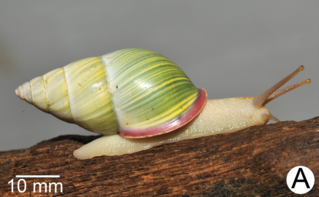
Amphidromus is a genus of tropical air-breathing land snails, terrestrial pulmonate gastropod mollusks in the family Camaenidae. The shells of Amphidromus are relatively large, from 25 mm (0.98 in) to 75 mm (3.0 in) in maximum dimension, and particularly colorful. During the 18th century, they were among the first Indonesian land snail shells brought to Europe by travelers and explorers. Since then, the genus has been extensively studied: several comprehensive monographs and catalogs were authored by naturalists and zoologists during the time period from the early 19th to the mid 20th centuries. Modern studies have focused on better understanding the evolutionary relationships within the group, as well as solving taxonomic problems.
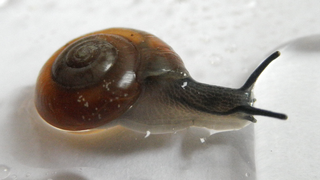
Aegopinella nitidula is a species of small land snail, a terrestrial pulmonate gastropod mollusk in the family Gastrodontidae, the glass snails.
The Cumberland Tigersnail or the Cumberland Disc, scientific name Anguispira cumberlandiana, is a species of small, air-breathing land snail, a terrestrial pulmonate gastropod mollusk in the family Discidae.

Clelandella perforata is a species of sea snail, a marine gastropod mollusk in the family Trochidae, the top snails.

Amphidromus perversus is a species of air-breathing land snail, a terrestrial pulmonate gastropod mollusk in the family Camaenidae.

Corona pfeifferi is a species of air-breathing land snail, a terrestrial pulmonate gastropod mollusk in the family Orthalicidae.

Scutalus mariopenai is a species of air-breathing land snail, a terrestrial pulmonate gastropod mollusk in the family Bulimulidae.
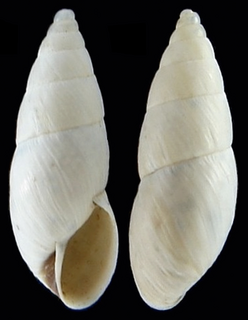
Bostryx chusgonensis is a species of tropical air-breathing land snail, a pulmonate gastropod mollusk in the family Bulimulidae.

Bostryx fragilis is a species of tropical air-breathing land snail, a pulmonate gastropod mollusk in the family Bulimulidae.
Bostryx granulatus is a species of tropical air-breathing land snail, a pulmonate gastropod mollusk in the family Bulimulidae.
Naesiotus bambamarcaensis is a species of tropical air-breathing land snail, a pulmonate gastropod mollusk in the family Orthalicidae.
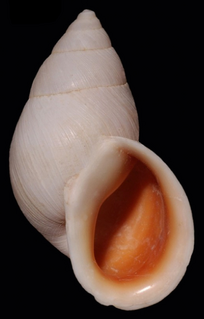
Scutalus phaeocheilus is a species of tropical air-breathing land snail, a pulmonate gastropod mollusk in the family Bulimulidae.
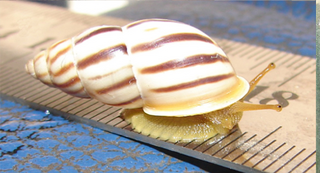
Drymaeus cecileae is a species of tropical air-breathing land snail, a pulmonate gastropod mollusk in the family Bulimulidae.
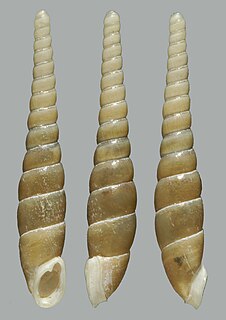
Leptacme cuongi is a species of air-breathing land snail, a terrestrial gastropod mollusk in the family Clausiliidae, the door snails.

Microgaza rotella is a species of sea snail, a marine gastropod mollusk in the family Solariellidae.

Odontotrochus chlorostomus is a species of sea snail, a marine gastropod mollusk in the family Trochidae, the top snails

Avicularia juruensis is a species of spider in the family Theraphosidae, found in South America. Avicularia urticans was brought into synonymy in 2017. It has been given the English name Amazonian pink toe spider. Under the synonym Avicularia urticans, it is also known as the Peruvian pinktoe tarantula. It is a large mygalomorph spider, with a maximum body length over 30 mm (1.2 in) and the longest fully extended leg about 60 mm (2.4 in). Like other species in the genus Avicularia, specimens under this name are sold as pets, although their identity has not been confirmed by taxonomic studies.
References
This article incorporates CC-BY-3.0 text from the reference [2]
- ↑ Pilsbry H. A. (1944). "Peruvian land Mollusca, II". Nautilus57: 118-127.
- 1 2 3 4 5 6 Breure A. S. H. & Mogollón Avila V. (2010). "Well-known and little-known: miscellaneous notes on Peruvian Orthalicidae (Gastropoda, Stylommatophora)". Zoologische Mededelingen 84. HTM Archived 2018-09-26 at the Wayback Machine .